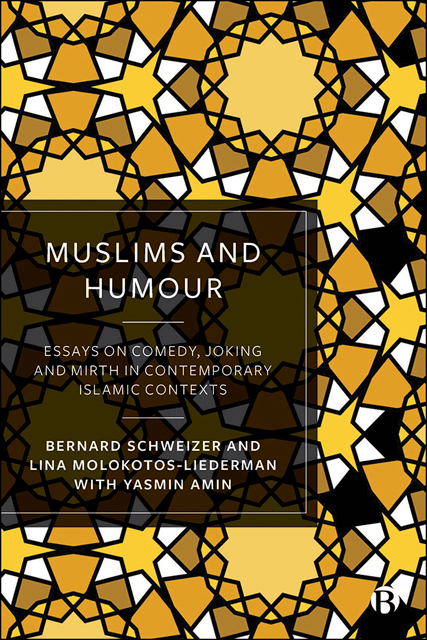Book contents
- Frontmatter
- Contents
- Notes on Contributors
- Acknowledgements
- Introduction
- Part I Theoretical Perspectives on Islam and Humour
- Part II Muslim Humour Practices in Islamicate Societies: Textual Media
- Part III Muslim Humour Practices in Islamicate Societies: Visual Media and Performance
- Part IV Muslim Comedy in North America
- Conclusion
- Bibliography on Islam and Humour
- Index
3 - Humour in Islamic Literature and Muslim Practices: Virtue or Vice?
Published online by Cambridge University Press: 13 October 2022
- Frontmatter
- Contents
- Notes on Contributors
- Acknowledgements
- Introduction
- Part I Theoretical Perspectives on Islam and Humour
- Part II Muslim Humour Practices in Islamicate Societies: Textual Media
- Part III Muslim Humour Practices in Islamicate Societies: Visual Media and Performance
- Part IV Muslim Comedy in North America
- Conclusion
- Bibliography on Islam and Humour
- Index
Summary
Introduction
If humour is a universal human attribute, then why is there no apparent consensus among Muslims about the permissibility of humour? The Qur’an confirms that it is God who gifted humankind with the ability to laugh. ‘It is He who makes [one] laugh and weep, and it is He who causes death and brings life’ (53:43). The most straightforward interpretation of this verse is that laughing is a gift from God to humankind, and ‘[it] is in the context of God's primordial and eschatological roles of creator and terminator that God is credited with causing humankind to laugh and to weep’ (Amin, 2021: 26). Nowhere in the Qur’an is laughter directly condemned.
It was reported in one famous hadith that Prophet Muḥammad joked and laughed with his companions and encouraged them to do so, as long as they do not lie. When some of his companions said, ‘O Prophet Muḥammad, yet, you also joke with us!’ He replied: ‘Yes, I do. But I only tell the truth’ (al-Tirmidhī, n.d.: 357).
Moreover, the Prophet not only laughed, but also jested and played practical jokes on his family members and companions. Among the many jokes recorded in the hadith tradition is one in which the Prophet informed an elderly woman that there will be no old women in paradise. She was naturally agitated by this and started to weep piteously. Then the Prophet quoted the Qur’anic verse (56:35) which states that all the women in paradise will be virgins (and hence young), and, her sadness evaporated.
Moreover, there is a vast collection of books of anecdotes and jokes belonging to the humour genre, generating laughter and amusement, yet also with an educational component. This collection is obvious evidence that humour, in Arabic literature, has a long-standing tradition. Thinkers and scholars produced many works in this genre, such as al-Jāḥiẓ's (c.776– 868/ 869) al-Bukhalā’ (Book of Miseries); Abū Ḥayyān al-Tawḥīdī's (c.923– 1023) Kitāb al-imtāʻ wa-al-muʼānasah (Book of Enjoyment and Bonhomie); Abū Isḥāq al-Ḥuṣrī's (1022) Jamʿ al-jawāhir fi al-mulaḥ wa al-nawādir (Collection of Jewels from Jokes and Anecdotes);
- Type
- Chapter
- Information
- Muslims and HumourEssays on Comedy, Joking, and Mirth in Contemporary Islamic Contexts, pp. 70 - 88Publisher: Bristol University PressPrint publication year: 2022

